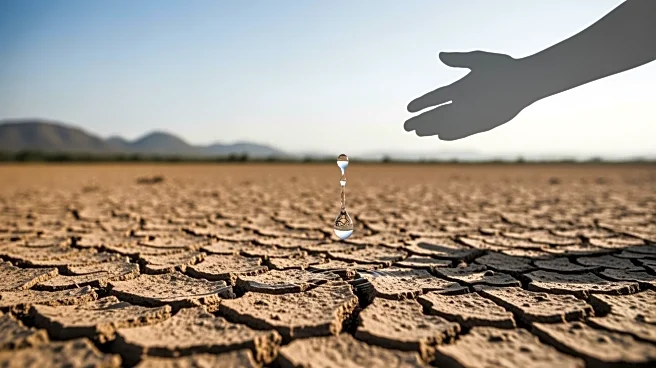What's Happening?
The Horn of Africa is facing a severe humanitarian crisis due to prolonged drought conditions affecting millions across the region. Countries like Kenya, Somalia, and Ethiopia are experiencing significant
livestock losses, with millions of animals dead and water sources drying up. The drought has led to widespread hunger and malnutrition, with millions requiring humanitarian assistance. Concern Worldwide has reached 2.5 million people with nutrition interventions and emergency response efforts. The crisis is compounded by inflation and rising food prices, exacerbated by global factors such as the war in Ukraine, affecting food imports.
Why It's Important?
The humanitarian crisis in the Horn of Africa underscores the vulnerability of the region to climate change and environmental challenges. The reliance on agriculture and pastoralism makes communities particularly susceptible to drought impacts, threatening food security and livelihoods. The crisis highlights the need for international support and effective aid delivery to address immediate needs and build resilience against future climate shocks. The situation also emphasizes the importance of sustainable development and climate adaptation strategies to mitigate the impacts of environmental changes.
What's Next?
Efforts to address the humanitarian crisis in the Horn of Africa must focus on enhancing aid delivery and supporting long-term resilience. International organizations and governments need to collaborate to provide immediate relief and support infrastructure development. Investing in climate adaptation and sustainable agricultural practices can help communities withstand future environmental challenges. Additionally, addressing inflation and food price volatility requires coordinated efforts to stabilize markets and ensure access to affordable food.
Beyond the Headlines
The crisis in the Horn of Africa highlights broader issues of climate vulnerability and economic instability. The region's dependence on agriculture and pastoralism makes it particularly susceptible to environmental changes, necessitating comprehensive strategies for climate adaptation. The role of international actors in providing aid and support is crucial, but efforts must also focus on empowering local communities and fostering sustainable development. Addressing the root causes of vulnerability, such as poverty and lack of infrastructure, is essential for long-term resilience.










